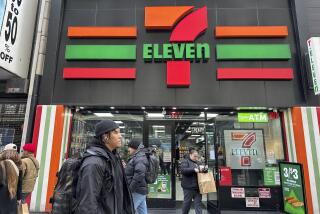Hafts Reach for Woolworth; Retailer Launches Defense
- Share via
When the Haft family of Washington plays the takeover game, it usually goes home without the prize. But the family, which controls the Dart Group, often walks away with a pocketful of cash.
That scenario has earned the Hafts a reputation as corporate raiders who put companies in play in order to reap profits from rising stock prices. Among their targets over the years have been some big names in retailing: Safeway Stores, Dayton Hudson, Supermarkets General Corp., Jack Eckerd Drug Stores and Revco.
And Monday came word that the Hafts have targeted another retailer: F. W. Woolworth Co.
The giant New York-based retailer announced Monday that a partnership controlled by Herbert H. Haft filed notice of intent to purchase $15 million or more of its stock, and retail analysts said the filing was most likely the beginning of a bid to take over the 108-year-old general merchandise and specialty chain.
Woolworth’s responded by launching an immediate “poison pill” defense, which seeks to deter a takeover by giving current shareholders the right to buy more shares at a cut rate in the event of a takeover attempt. The retailer said it took the action to deter “coercive or unfair takeover tactics.”
In a letter to shareholders, Woolworth’s Chairman Harold E. Sells, said: “The plan is designed to deal with unilateral actions by hostile acquirers which may be calculated to deprive a company’s board and its shareholders of their ability to determine the destiny of the company.”
Woolworth’s declined comment on other defensive moves that it might make. But analysts said the company may seek a leveraged buyout or another suitor to block Dart. Meanwhile, Woolworth’s stock soared by $8.875 a share in trading on the New York Stock Exchange to close at $54.125.
Woolworth’s has “phenomenal cash flow and there is considerable real estate value in its assets,” said analyst Carol Palmer of Duff & Phelps Inc. The company has also done very well since a restructuring in 1982 when it began to emphasize specialty retailing such as its Kinney Shoe Corp., said Lee Margosian, an analyst with Thomson McKinnon Securities.
Woolworth’s earned $251 million on sales of $7 billion in 1987. Net income was up from $214 million in 1986 on sales of $6.2 billion.
The Hafts couldn’t be reached for comment. A source close to the family confirmed that Monroe Partnership, controlled by the Hafts, is a holder of some Woolworth’s stock and has filed intent to purchase a substantial block as required under the federal Hart-Scott-Rodino antitrust act.
The source declined to comment on the Haft family’s intentions toward Woolworth’s but said the family stands by its previously stated desire “to own and operate a major retailer.” Herbert Haft founded the company in the 1950s, using one Washington drugstore to launch the Dart Drug chain. The drugstores were sold in 1984, but the company now operates Crown Books, a discount retailer, and Trak Auto, a discount auto parts chain.
Few analysts said they believed that the Hafts really want to acquire and operate Woolworth’s.
“Given their history, I would say the answer is no,” said Monroe H. Greenstein, a retail analyst with Bear, Stearns & Co.
“If they really wanted to operate a company, they would talk to Campeau and make a deal to buy Ralphs or make a deal with somebody who really wants to sell,” said another analyst.
Campeau Corp. last week won a two-month battle to acquire Federated Department Stores and has announced plans to sell some of its department store chains. Campeau also sold many of the retail chains it acquired after taking over Allied Stores in 1987.
The Hafts, operating primarily through Dart Group, have in recent years launched a number of unsuccessful attempts. Darts efforts to swallow bigger fish have been continuously frustrated by retailers who seem to have gone to great lengths to avoid getting caught by Dart’s hooks.
Safeway managers arranged a $4.1-billion leveraged buyout to escape Dart, taking on a debt load that required selling off a profitable division and selling, or closing, several U.S. grocery stores.
Dart Group was estimated by analysts to have earned about $150 million after dropping the bids in the midst of fierce resistence and selling its stock in the targeted companies.
More to Read
Inside the business of entertainment
The Wide Shot brings you news, analysis and insights on everything from streaming wars to production — and what it all means for the future.
You may occasionally receive promotional content from the Los Angeles Times.










